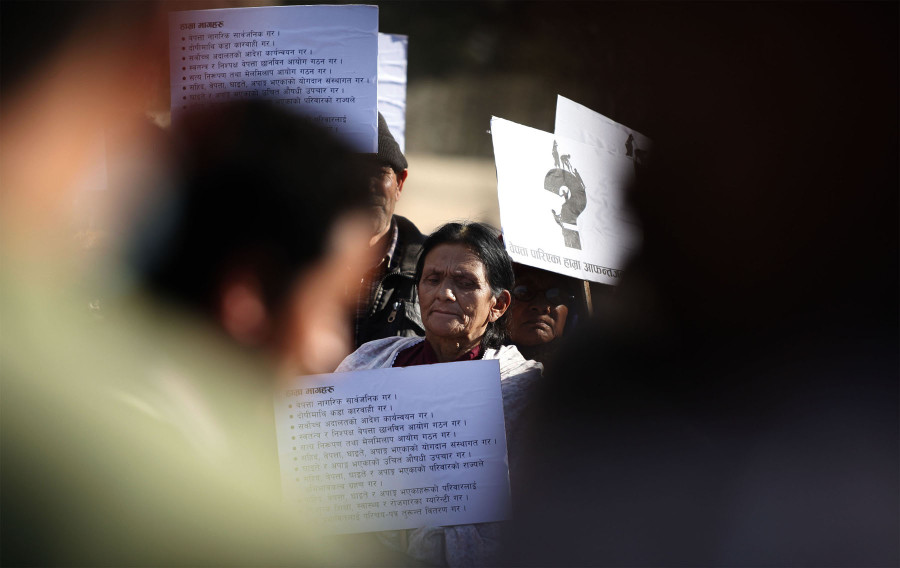National
Nepal failed to ensure justice for conflict victims, as the government continued to stifle freedom of expression, Human Rights Watch says
The rights body’s World Report 2020 has also taken note of draconian legislation and controversial decisions that the Oli administration has made in the past year.
Post Report
Human Rights Watch has painted a bleak picture of Nepal when it comes to freedom of expression, online expression and justice for victims of decade-long conflict.
“The government of Nepal is working to undermine the rights to freedom of expression and association while denying justice for conflict-era abuses,” the New York-based international rights watchdog said in its World Report 2020 made public on Tuesday. “Harassment and arrests of journalists increased, while draft legislation placed draconian restrictions on online expression, and the authorities sought to constrain nongovernmental organizations and civil society.”
In the 652-page World Report 2020, Human Rights Watch has reviewed human rights practices in nearly 100 countries.
“The Nepali people struggled for decades to institutionalise a democratic constitutional order, and yet are now being denied their rights by the very people they had hoped would represent those values,” a statement by the rights body quoted Meenakshi Ganguly, the watchdog’s South Asia director, as saying. “Political parties, once they are in government, are fighting tooth and nail to stifle critical voices and protect those allegedly responsible for past war crimes.”
A major concern by the international rights watchdog is Nepal’s snail-paced transitional justice process, which has been dragging on for more than a decade now.
“The transitional justice process to address grave abuses committed during the 1996-2006 conflict between government forces and former rebels, who are now part of the government, is stalled, despite commitments in the Comprehensive Peace Agreement and Nepal’s obligations under international law,” said the rights body. “The government has repeatedly failed to implement a 2015 Supreme Court ruling to amend the law on transitional justice to prevent amnesties for the worst crimes.”
According to the report, the process to reappoint commissioners to the lapsed transitional justice commissions has been undermined by political interference, and the government has declined to engage in meaningful consultations with victims’ groups.
As part of its bid to address the concerns of the conflict victims, rights defenders and the international community, the government earlier this week organised consultations in the provincial headquarters of all the provinces. But conflict victims have decried the efforts as a sham and too little too late. The Law Ministry, which organised the consultations on behalf of the government, had allocated just three hours, where conflict victims were made to listen rather than being given an opportunity to speak.
“Some of our friends couldn’t even put forth their concerns due to time constraints,” Badri KC, a conflict victim from Baglung who was present at the consultation in Pokhara, told the Post after the consultations on Monday. “Rather than listening to our voices, the discussion was aimed at showing that the government has taken our feedback to amend the Act.”
Draconian legislation and controversial decisions that the KP Oli administration has made are also a cause for concern, according to Human Rights Watch.
“The government has put in place a variety of policies aimed at limiting the autonomy of nongovernmental groups, many of which campaign for human rights, accountability, and social change,” said the rights body. “Yet another draft law aims to prevent the National Human Rights Commission from independently bringing cases to court.”
The rights body has also taken note of arrests of journalists, bloggers, and rappers for reporting on corrupt business practices, publishing negative movie reviews, or singing about youth culture over the past year.
Nepal has also failed to address the rising cases of violence against women, according to the report.
“The United Nations special rapporteur on violence against women reported that rape cases appear to be increasing,” it said. “Domestic violence is the leading cause of homicide in Nepal, yet the government’s response is hindered by gaps in legislation, insufficient resources, and poor training. Women from marginalised communities are especially vulnerable to sexual violence. One in five rape cases is of a child under age 10.”
The rights body has also pointed out the delay, and its repeated calls in the past, in making public the Lal Commission report.
“The government has flouted its commitment to release its own official report, known as the Lal Commission report, about the policing of protests in 2015, in which 66 people died,” said the report.
The government had formed the commission under the chairmanship of former Supreme Court justice Girish Chandra Lal on September 18, 2016, with the mandate to probe the incidents that took place during the Madhes movement, to find facts about the incidents, to recommend compensation for the victims and action against those held responsible for the killings.
After the Rastriya Janata Party Nepal repeatedly obstructed parliamentary proceedings, the House Speaker on March 13 had issued a ruling to the government to make public the Lal commission report. The government, however, has yet to do so.
Human Rights Watch in its report has also expressed concerns about the Nepal government excessively serving to Chinese interests.
“The government is bending to Chinese demands by prohibiting domestic freedom of expression in relation to Tibet,” said the report. “During the visit of Chinese President Xi Jinping, at least two Nepali citizens were arrested for wearing clothing that featured a Tibetan flag.”




 13.12°C Kathmandu
13.12°C Kathmandu













